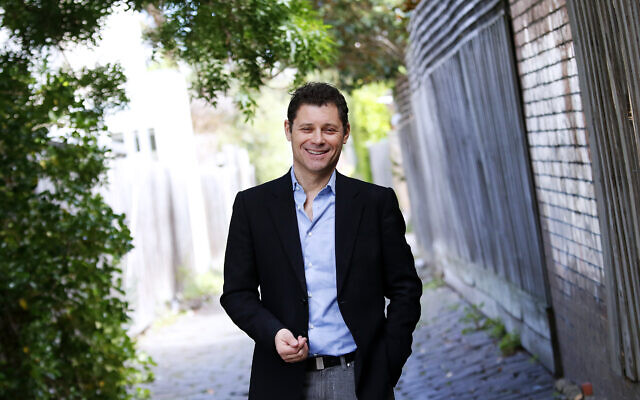Poignant Perlman
Author Elliot Perlman speaks to The AJN following the release of his seventh title, Maybe the Horse Will Talk.
ELLIOT Perlman has been busy since the release of his last work of adult fiction, The Street Sweeper, the evidence of which whir by on two small scooters when we meet at his favourite Elsternwick cafe. Yet, while eight years may have passed, Perlman’s fiction remains as relevant and poignant as ever in his latest release, Maybe the Horse Will Talk.
Short black in tow, Perlman has just returned from Canberra with his national book tour in full flight, brimming with bookshop appearances, interviews and radio slots.
“I enjoy most of it,” Perlman shares, “except for waiting around airports and being away from family”.
Ironically, it is the juxtaposition of work and family in contemporary life that are key themes examined in Perlman’s new title – albeit, the competing demands of work are set against the backdrop of a toxic corporate world – through the character of Stephen Maserov.

A one-time teacher, Maserov is a second-year lawyer working at the uber-competitive firm Freely Savage Carter Blanche. Aside from the incessant pressures of relentless budgets, work hours, and a fierce bully culture, matters are made worse by Maserov’s disintegrating marriage, with his wife losing patience with her role as an increasingly solo parent. Then, Maserov learns that his lifespan at the firm is marked, and in a moment of opportunism he devises a plan to buy himself more time in order to turn around his fate.
“He is our every person,” explains Perlman, “and he deals with the same questions really that I find myself posing for many of my central protagonists; how do you survive even if you don’t prosper? How do you survive with your ethics intact in a crazy, Kafka-esque immoral, cruel world?”
Perlman also takes the reader on a journey through the endearingly Jewish Maserov’s internal dialogue as he nervously navigates his own morality.
In true Perlman style, he holds a mirror to the reader, reflecting a social commentary on the reality of modern Australian society. It reveals uncomfortable truths, and begs the reader to consider, what will be the long-term ramifications of this unbalanced work/life mix that has been created? How will it affect the way we communicate and how we relate to others? What is it doing to the fabric of the household – and society at large?
With a litany of literary awards to his name, Maybe the Horse Will Talk is Perlman’s seventh title and follows on from his first foray into children’s fiction with The Adventures of Catvinkle released last year – a sequel which, he teases, is currently in the works.

While Perlman was inspired to tackle the subject matter after the realisation that “Australia is in the grips of chronic stress”, the novel risks being enveloped by the solemnity of the topics at hand, but he injects welcome hilarity throughout.
“I think it is possible to make these issues funny by deflating the bullies, by showing that the emperor has no clothes, and that can be incredibly comforting.”
The cut-throat callousness of some of his corporate characters are not unfamiliar to Perlman, who describes himself as “a recovering lawyer”. He observes the “white collar serfdom” of the employee who did well at university to get ‘the job’ at ‘the firm’, only to be doing photocopying at 3am.
“My experience wasn’t nearly as bad as that of any of my characters, but I also had horrible experiences, and I saw a variety of responses to it.”
In a post-#MeToo world, the novel also thrusts sexual harassment to the forefront, an issue that Perlman recalls from his own time as a barrister.
“The way certain people – men – partners, would behave with women, in front of other people even, was as though they had the expectation of complete -impunity.
“If you’re going to write about the toxic workplace, you have to write about sexual harassment because it is so rife. It would be remiss of me to be talking about the toxic workplace and not to deal with it.”
But Perlman remains somewhat optimistic, hoping that society will move further towards people being treated with greater respect at work, without intimidation.
“There should not be any abuses of power,” he adds.
“And in a macro sense, there needs to be more jobs. The reason that people put up with such appalling treatment is because they don’t want to be a part of the unemployed or the involuntarily underemployed in the gig economy.”
Perlman observes, “The precariousness of employment, as well as increasing inequality between the very wealthiest, and everybody else, which is at a peak not seen for about 100 years, leads to incredible stress.
“Throw in the additional ingredients to the cocktail, like social media, which is exacerbating people’s feelings of inadequacy and feelings of isolation. You put that all together and you see just how close society is at any given moment to a major conflagration.”
As his coffee cup empties, Perlman notes, “Things are not going to change until society starts talking about it.”
Maybe the Horse will Talk is published by Penguin Books. RRP $32.99. Visit www.penguin.com.au/books/maybe-the-horse-will-talk-9780143781493.


comments